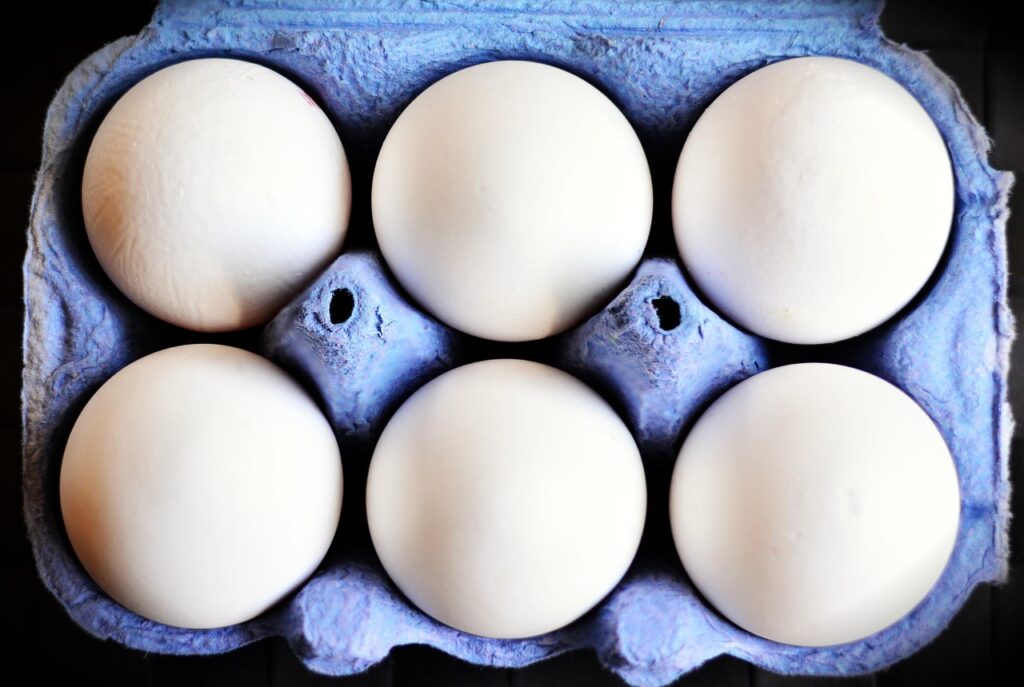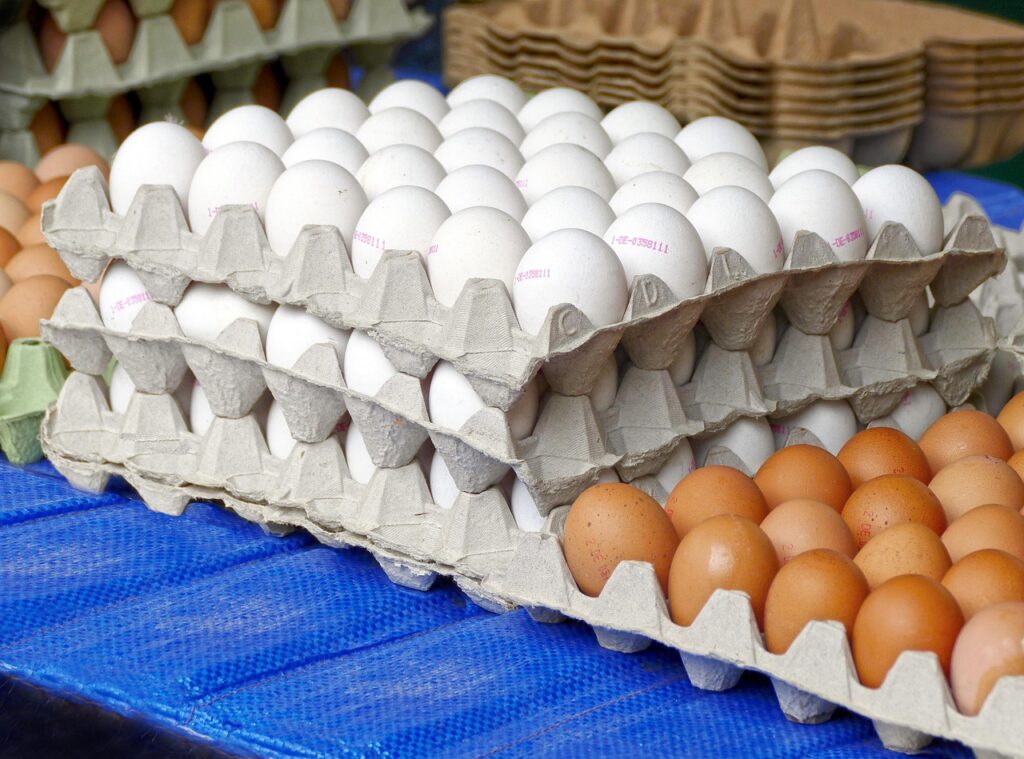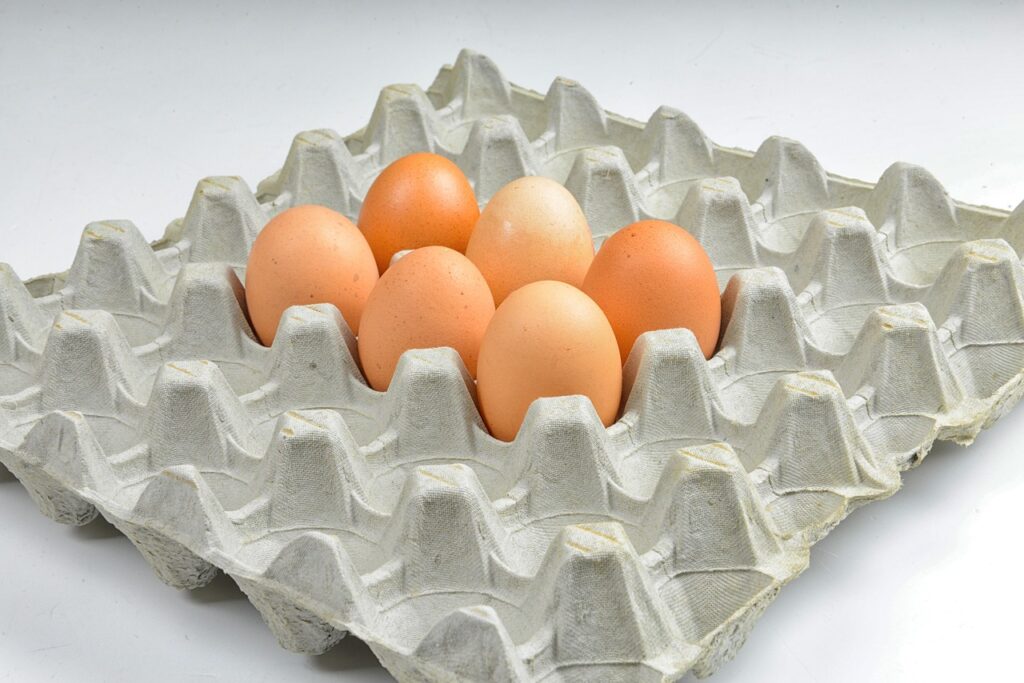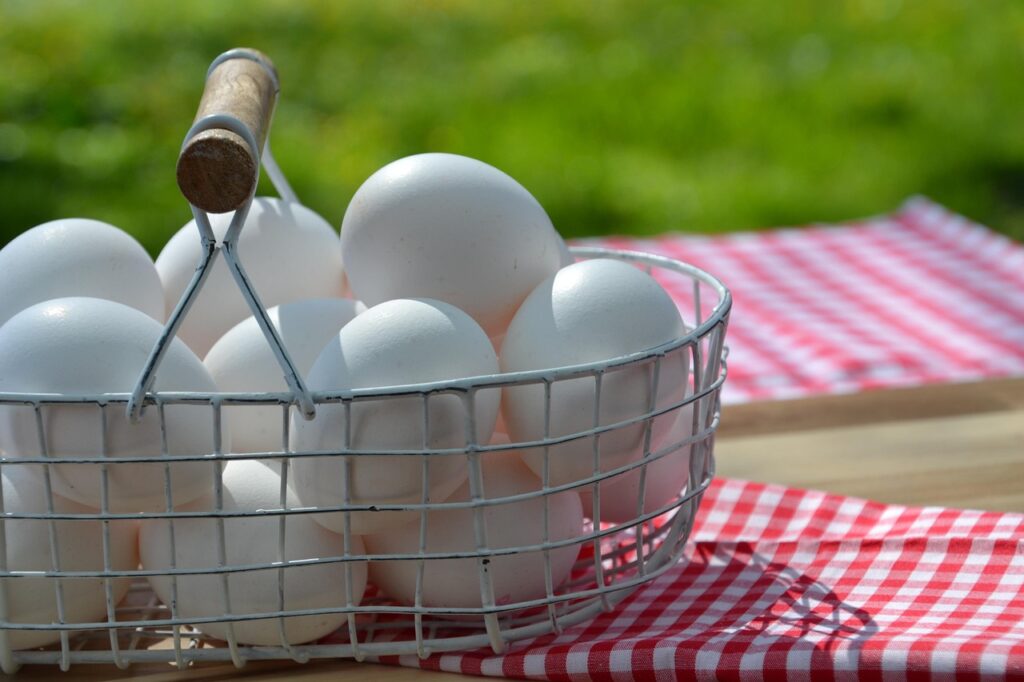Understanding the Natural Coating: The Bloom
Freshly laid eggs have a natural protective layer called the “bloom” (or cuticle). This microscopic coating seals the eggshell’s pores, shielding it from bacteria and moisture loss. If left intact, the bloom helps eggs last 2–3 weeks unrefrigerated under the right conditions.
Key takeaways:
- Unwashed eggs = longer shelf life at room temperature.
- Washing eggs removes the bloom and invites bacteria.
- USDA guidelines require washing eggs before sale, which is why refrigeration is essential in the U.S.

Image by congerdesign from Pixabay
Room Temperature vs. Refrigeration: What’s Safer?
Let’s clear the air: refrigeration is not mandatory in many countries. In fact, in Europe and parts of Asia, it’s rare to refrigerate fresh eggs.
| Condition | Refrigerated Eggs | Unrefrigerated Eggs |
| Shelf Life | 5–6 weeks | 2–3 weeks (unwashed) |
| Risk of Salmonella | Lower | Higher (if washed) |
| Taste Retention | Good | Slightly better (when fresh) |
Verdict: If your eggs are unwashed and stored in a stable, cool area, they’re safe outside the fridge for a few weeks.
How Long Can Fresh Eggs Sit Out? Country Comparisons
Here’s how long fresh, unwashed eggs typically last unrefrigerated:
| Country | Common Practice | Shelf Life (Room Temp) |
| USA | Refrigerated only | 2 hours (washed) |
| UK / EU | Pantry storage | 2–3 weeks |
| Philippines | Room temp storage | 2 weeks (typical) |
| Japan | Refrigerated only | 2 hours (washed) |
| France / Spain | Room temp storage | 2–3 weeks |
In general, if your ambient temperature stays below 68°F (20°C) and eggs are unwashed, you’re safe for at least two weeks.
Factors That Affect Egg Shelf Life
1. Temperature Fluctuations
Eggs hate temperature swings. Store them in a cool, stable environment like a pantry or root cellar.
2. Cleaned vs. Unwashed Eggs
- Unwashed eggs retain their bloom and natural defenses.
- Washed eggs are more porous, losing protection and requiring refrigeration.
3. Humidity and Air Circulation
Too much humidity can encourage mold. Poor airflow traps moisture—both can cause eggs to spoil faster.
How to Test if an Egg is Still Good
The float test is the go-to method:
| Egg Behavior | Condition |
| Sinks flat | Very fresh |
| Sinks, but stands | Still okay |
| Floats | Likely spoiled |
Crack it open if unsure—bad eggs smell foul. Trust your nose.
Farm Fresh vs. Store-Bought: Shelf Life Differences
| Type of Egg | Washed | Bloom Intact | Unrefrigerated Shelf Life |
| Farm Fresh | No | Yes | 2–3 weeks |
| Store-Bought (US) | Yes | No | Max 2 hours |
| Organic (EU) | No | Yes | 2–3 weeks |
Bottom line: Freshly collected farm eggs win for shelf life, as long as they’re not washed.

Image by Wolfgang Eckert from Pixabay
Storage Practices Around the World
– U.S. Egg Safety Standards
The USDA mandates egg washing to reduce salmonella risk—this makes refrigeration necessary.
– European Union Approach
EU regulations ban egg washing commercially. The natural bloom remains, reducing need for refrigeration.
– Rural Traditions in Asia and Africa
In rural households, eggs are stored in baskets or on countertops—proof that traditional methods can still be safe.
Best Practices for Storing Eggs Without Refrigeration
Ideal Temperature Range
- Target: 55°F to 68°F (13°C to 20°C)
- Avoid sunny spots, ovens, or near stoves.
Choosing the Right Container
- Use cardboard cartons to reduce moisture buildup.
- Avoid plastic unless well-ventilated.
Avoiding Cross-Contamination
- Store away from raw meat.
- Don’t let eggs sit in water or moisture.
How to Use Eggs That Have Been Left Out
Still good? Here’s how to use them smartly:
- Baking: Slightly older eggs whip better.
- Hard-boiled: Older eggs peel easier.
- Scrambled or Omelets: Use immediately after cracking.
Note: Do not wash and refrigerate eggs that have been left out for days. This traps bacteria inside.

Tips for Extending Shelf Life of Fresh Eggs
- Rotate daily: First in, first out.
- Use lime water: Submerge unwashed eggs in hydrated lime + water mix.
- Keep shells dry: Moisture invites mold.
Bonus: Dehydrating or freezing raw eggs are great long-term storage options (crack and beat them first).
When to Throw an Egg Away
Signs it’s time to toss:
- Foul sulfur smell
- Cracked shell or leakage
- Mold or discoloration
- Floats during test
Safety tip: When in doubt, throw it out.
FAQs
1. Can I store eggs in a basket on the counter?
Yes, if unwashed and in a cool, dry area.
2. Is it okay to refrigerate eggs after leaving them out?
Only if they’ve been out less than 2 hours (U.S.). Longer = discard or keep room-temp.
3. What temperature is safe for storing eggs unrefrigerated?
Between 55°F and 68°F (13°C–20°C) is ideal.
4. Can washed farm eggs be left out?
Not recommended. Without bloom, bacteria can enter easily.
5. Do eggs last longer if stored upside down?
Yes. It helps keep the air cell stable, delaying spoilage.
6. What’s the best way to store eggs in hot climates?
Use lime water or cold pantry spots. Otherwise, refrigerate.

Conclusion: Trust Your Senses, Know the Science
Fresh, unwashed eggs are naturally resilient when handled correctly. By understanding how temperature, moisture, and handling affect shelf life, you can confidently store eggs unrefrigerated—just like millions around the world.
